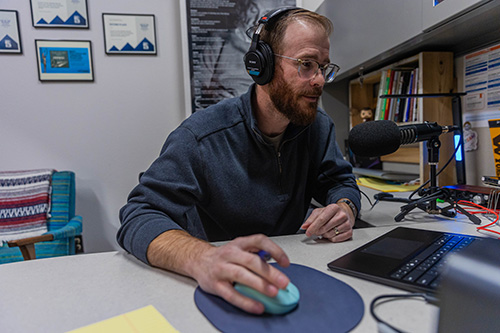DEC
History podcast tells the human story in relatable ways
Charles Fournier wants to make history accessible.
The Laramie County Community College English instructor and long-time audio storyteller
is looking to do just that with a new podcast series “The Historian's Table.” Knowing
the subject matter can be complex, Charles said it’s important for people to think
about these stories because it can improve conditions in the present. 
“If we want a better, honest look at history, we’ve got to be able to accept that people are contradictory and that no story is entirely black or white,” Charles said. “History helps us understand ourselves and hopefully make better decisions moving forward.”
"The Historian’s Table" is a six-part podcast series funded by Tufts University that delves into history through a deeply personal and narrative lens. Centered on Diego Javier Luis’s groundbreaking research on the first Asians in the Americas during the 16th-century transpacific voyages of the Manila Galleons, the series intertwines rich historical content with Diego’s personal story.
By drawing parallels between the subjectivity of historical interpretation and the complexities of personal identity, the podcast offers a unique exploration of how the past shapes collective and individual understanding.
“The idea that history is written by the winners means we’re often seeing it through a very narrow lens, shaped by a limited group of perspectives,” Charles said. “Diego, as a historian with a complex personal background, brings a unique lens to how he views the past. His values naturally influence what he chooses to highlight, blending the subjectivity of personal experience with the study of history.”
Charles is the host, producer, editor, writer and engineer, working closely with collaborators to create the final product. It sounds complicated, but it's hardly Charles’ first foray into audio storytelling and podcasting.
The journey into audio storytelling began during Charles’ career as a volunteer assistant producer for "HumaNature" at Wyoming Public Media. Charles then contributed to the "Modern West" podcast, exploring the theme of belonging in Wyoming. As an independent creator, he produced "Those Who Can’t Teach Anymore," a podcast that delves into the struggles and stories of educators. The project, funded by a grant, earned recognition with an Ambie nomination and multiple journalism awards.
From his childhood days listening to “Car Talk” and other audio storytelling heard on broadcast channels, Charles said he found an authentic tone in the art form, appreciating the intimacy conveyed to listeners.
The interweaving of Diego’s personal and historical discovery creates a human element that can draw listeners in. While the complexity of the historical subject matter could leave some unsure whether they’re interested, the personal story can draw them back in, Charles said. Having listeners connect to Diego’s personal journey might give them access to valuable insights about the history he explored.
That’s critical, Charles said, because it can help people understand the difficult challenges faced in the world today.
“To understand the complicated challenges we face today, we need to look at history,” Charles said. “We’re here for a reason, shaped not by a simple set of dominoes, but by a spider web of events that brought us to this moment. Exploring these connections can help us better understand how we got here.”
“The Historians Table” is available on streaming platforms such as Apple Podcasts and Spotify.
